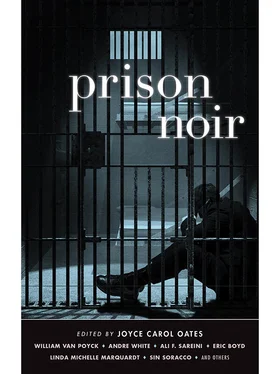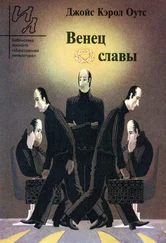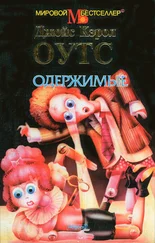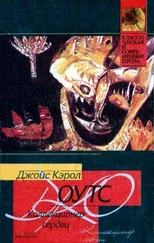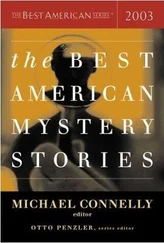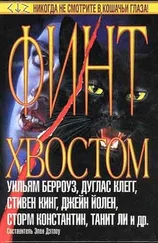Джойс Оутс - Prison Noir
Здесь есть возможность читать онлайн «Джойс Оутс - Prison Noir» весь текст электронной книги совершенно бесплатно (целиком полную версию без сокращений). В некоторых случаях можно слушать аудио, скачать через торрент в формате fb2 и присутствует краткое содержание. Год выпуска: 2014, Издательство: akashic books, Жанр: Крутой детектив, на английском языке. Описание произведения, (предисловие) а так же отзывы посетителей доступны на портале библиотеки ЛибКат.
- Название:Prison Noir
- Автор:
- Издательство:akashic books
- Жанр:
- Год:2014
- ISBN:нет данных
- Рейтинг книги:3 / 5. Голосов: 1
-
Избранное:Добавить в избранное
- Отзывы:
-
Ваша оценка:
- 60
- 1
- 2
- 3
- 4
- 5
Prison Noir: краткое содержание, описание и аннотация
Предлагаем к чтению аннотацию, описание, краткое содержание или предисловие (зависит от того, что написал сам автор книги «Prison Noir»). Если вы не нашли необходимую информацию о книге — напишите в комментариях, мы постараемся отыскать её.
Prison Noir — читать онлайн бесплатно полную книгу (весь текст) целиком
Ниже представлен текст книги, разбитый по страницам. Система сохранения места последней прочитанной страницы, позволяет с удобством читать онлайн бесплатно книгу «Prison Noir», без необходимости каждый раз заново искать на чём Вы остановились. Поставьте закладку, и сможете в любой момент перейти на страницу, на которой закончили чтение.
Интервал:
Закладка:
Everyone I grew up with in South Minneapolis knew someone in the collage of their lives who had slept in one of these cages. Back then I wanted to pretend it didn’t exist, but some of my friends, like Slick, had been waiting on their trip their whole lives. Its name was passed around offhandedly in conversations about where people had disappeared to, without an exact vision of what really happened there. When I got here, though, I saw it differently, mostly just shrinking space and time to make it as absurd or as monstrous as any of us wanted it to be.
Fall
I was on the phone with Mel when it happened. It was the twentieth anniversary of Sonny’s death. By the end, she had broken down to bone holding onto skin. I told Mel how wicked it was that Sonny died, while I had never figured out how to live in the first place. “It’s wrong how fate never lets us switch places.” I was trying to tell her how hopeless the whole place felt. “You become like a robot that resets its feelings every morning.” She said she would send me a Bible. I told her that people’s Bibles were being stolen just so they could set them on fire. They weren’t, but it sounded good.
Then I smelled the smoke, husky and chemical. I looked behind the back of the cellblock and everything was moving toward me. A wall of guards stormed the door into the commotion of bodies. Guys were coming with armfuls of things retrieved from their cells, some had made satchels with blankets. I could see enough smoke in the back half of the room to know it wasn’t just a garbage can. I tried to go get my photo album, but was stopped by a guard.
I tried to see it, but there was just too much smoke. Some guys watched without regard to alarms and voices on microphones. Sirens blared in the distance, getting louder the longer I stayed. Guys ran toward the doors, some pumping their fists with crooked smiles and something covering their faces. It moved down the tiers, eating at anything flammable, ducking into cells and consuming. Staff was having a hard time getting at the closest fireboxes — they must have reacted too late, because the combustion was too strong by the time firefighters got there.
There were guards still walking the tiers to get people out of their cells. Slick had been one of the first out the door, with a blanket that could have had everything he owned wrapped up in it. I saw Mississippi leave his room in his work boots and a mug in his hand. I saw Rudy, barely holding his clothes on his body, glance back at the flames coming at his cell, then turn and walk toward the door. The smoke was too much for me to take now, so I followed the herd, who were yelling and kicking at each other’s heels toward the yard. One old man whacked another with his cane for tripping him in the rush.
There was a mass convergence with guys from all different cellblocks. “Damn, the joint’s going crazy!” one guy hollered. “It’s about time!” The hallway was filled with coughs and gags. The yard was packed with bodies and there was a steady stream still coming behind me. The last stragglers to find the yard were mostly guards, holding up a few remaining soot-faced inmates. Slick found me; he was eating from a bag of chips he’d brought out with him. I looked around for everybody I knew. Mississippi had a spot against the wall, the flickers of light reflecting off his bald head. There were too many of us to sort everyone out. Hundreds of us standing or sitting like kids on a hill watching fireworks.
From out of the dark behind me, an old guard I knew slid down on me. “You believe this? This is gonna change some stuff — yeah, it’s gonna change some shit.” Peering out on the yard at everyone, like heads bobbing in the ocean, I knew he didn’t mean it would get better.
Black smoke and orange flames rose into the sky. Brick and sandstone that was once so secure, collapsed, and was welcomed with applause. Let them try to save it. The water from the trucks and the hydrants attempted to stop it, but it had already burned what it was supposed to. I felt the fire — not its heat, but its history.
I was looking at that miserable old building that had taken so much more than it would ever give back. It burned for every soul this place ever held captive, every dream broken, every chopped tree. There was fire for every year it consumed, every emasculating word, every memo, every untreated illness, for every bloodred cent stolen and absorbed, every family member who passed away. It told us that for all the things we knew this place to be, even the oldest of institutions can burn, break down into ash. I was proud to watch its destruction. Sirens blared, and the ship sank. It was the moment I survived for, wore my scars for. To see the animals burn down the zoo. I swear I could see the faces of all those trapped souls escaping, William Williams dancing in the smoke. They would find somewhere for us tomorrow, but for this night, a blanket slung over my shoulders, watching flames reach up and nip the stars, I was fine. Let the motherfucker burn. There would be seeds for next year.
Afterward there were details. They said six people died of smoke inhalation, unable to get out of their cells. They said the fire started from a pile of clothes doused with gasoline, in the room of a seventy-year-old man who never left his cell. He was caught on surveillance cameras before the fire, spraying something up and down the tier from a plastic bottle. Another story came out about some dumb kid who died after being rousted from his cell; he had walked the tier, then doubled back to his room only to get back underneath his blanket for the smoke to engulf him.
IMMIGRANT SONG
BY MARCO VERDONI
Marquette Branch Prison (Marquette, Michigan)
Celso had never seen snow before. Up here it was everywhere. Beyond the fences and coils of concertina wire, there was no horizon. The sky and earth were just an endless white void.
The cold seemed to make everybody angry. The COs were always yelling at him in a language he didn’t understand — and when they realized this, they’d just say everything louder and VEY-REE SLOW-LY, as if that made it easier for him.
Comprende? They always knew that word. Even the nurses who stuck him with needles and drained his blood and told him to piss in this cup and clip his nails and strip naked and stand over here, turn your head, cough, and sign this form, okay? Just put your name here, comprende ?
His attorney spoke Spanish, but that didn’t help Celso understand any of the legal jargon. The deal he signed might as well have been in braille. In any language, he didn’t know how to read.
It was spring when he came to the States; summer when they arrested him. The jail didn’t have any windows, so when the van came to take him to prison, he didn’t know what the brown slush was on the floor. He thought it was vomit.
“It’s a blizzard,” the driver said, pulling out of the jail. “Total whiteout.”
Celso knew that word— blizzard . Marichuy taught it to him.
“It means snowstorm,” she said. “They have them all the time in North America.”
La Ventisca . That’s what he started calling Marichuy’s mother after that, because whenever she showed up, Marichuy got cold. Sometimes she’d catch him in Marichuy’s bedroom and would have to chase him down the dirt road with a stick. But he could always outrun her. He couldn’t say the same for Marichuy’s brothers. The first time, they just roughed him up outside the church. The second, they chased him through the jungle, all the way back to the farm, and knocked some of his teeth out in the bean field.
“I warned you,” his father said. “Didn’t I warn you? Those schoolgirls are only trouble. If you want to get your dick wet, go see Cande and her whores at the cantina. Those boys will kill you if they catch you again.”
Читать дальшеИнтервал:
Закладка:
Похожие книги на «Prison Noir»
Представляем Вашему вниманию похожие книги на «Prison Noir» списком для выбора. Мы отобрали схожую по названию и смыслу литературу в надежде предоставить читателям больше вариантов отыскать новые, интересные, ещё непрочитанные произведения.
Обсуждение, отзывы о книге «Prison Noir» и просто собственные мнения читателей. Оставьте ваши комментарии, напишите, что Вы думаете о произведении, его смысле или главных героях. Укажите что конкретно понравилось, а что нет, и почему Вы так считаете.
